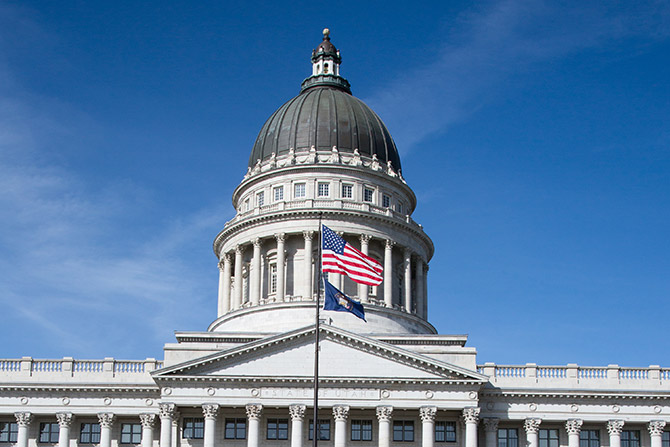Arnold Palmer once said, “Golf is deceptively simple and endlessly complicated; it satisfies the soul and frustrates the intellect. It is at the same time rewarding and maddening …” Despite my meager efforts to play the game, I find myself defaulting to another famous golf quote from the immortal words of Mark Twain: “Golf is a good walk spoiled.”
I can’t help but draw a comparison between the game of golf and the most recent legislative session. With all due respect, the players converged, possibly slightly overdressed, with a bag of tools in hand … blank scorecard but pencils at the ready to record the event and/or modify it. The perceived 30 minutes’ worth of exercise stretches to an unbearable two and a half hours. Each hole played to its conclusion, only to begin the next again and again until, finally, the last ball dropped, and the fans dispersed. Similarly, our legislators congregated on Capitol Hill with a plan in hand and the hopes for a hole-in-one.
The AIA Government Affairs Committee (GAC) also surged into the session, but with the targeted goal, “To promote and enhance the health and safety of all Utahns in the built environment through relationship building and lobbying of government officials.”
This year, GAC narrowed 962 legislative works down to a list of 52 bills to track. Those bills included topics related to professional licensure, building codes, planning and land use, energy, social, real estate and business. Some derived from personal experiences, others from community clamor, some from agencies within the state and others from interests out of state. On every front, they make their way through committees, draft revisions and substitutions to land at the final floor vote before being signed into law. There is definitely a certain stamina required, but fortunately, we have engaging and well-respected lobbyists. Our efforts within the industry, combined with their efforts behind the scenes, continue to be an effective pairing.
For the past several months, the GAC has been working hand in hand with industry professionals, various organizations, lobbyists and lawmakers to improve the professional ecosystem and enhance the lives of friends, family and strangers alike. Where they were able, they were involved in interim sessions, carefully evaluated proposed legislation and debated the merits in the hope of contributing to positive outcomes for our state and our communities. Leading up to the 2025 session, the GAC tracked past legislation, trending issues and technical subject matter related to the built environment. They looked for potential pitfalls as well as opportunities to raise the proverbial bar in our industry and, as a result, our communities.
This year, the following bills warranted particular involvement from the GAC:
- H.B. 037 — Utah Housing Amendments: This bill focused on opportunities to expand affordable housing in Utah. GAC worked with the representative to align housing concepts with associated code designations and requirements. GAC suggestions were incorporated.
- H.B. 040 — School Safety Amendments: The bill makes amendments to building safety provisions for K-12 schools. While GAC was able to discuss several provisions of the bill with the representative, the most encouraging result was an invitation to join future discussions related to the implementation of the bill’s provisions.
- H.B. 048 — Wildland Urban Interface Modifications: This bill incorporates provisions for counties and municipalities to study Wildland Urban Interface (WUI) areas and adopt WUI codes as appropriate. While no direct action was taken from GAC, we support provisions that enhance life safety in WUI areas.
- H.B. 058 — Building Inspector Amendments: Provisions related to building inspectors were updated to include third-party hires and certain qualification requirements for those individuals. GAC worked with representatives to include feedback that was incorporated before adoption.
- H.B. 114 — Architect’s Licensing Act Amendments: The sponsoring representative sought relief for constituent home designers who felt they had been targeted for misrepresenting their services. After research and discussion with the representative, GAC offered alternative language intended to clarify the intent of the rules for enforcement purposes. The language was adopted. GAC and others feel the language could be clarified further in coming sessions or as the occasion arises, but definitely consider our efforts a success from the original language of the bill.
- H.B. 160 — Professional License Degree Amendments: This bill proposed language based on a misunderstanding of provisions for licensure in the state of Utah. Where other states offered alternative paths to licensure outside of a university setting, it was thought a similar path was not available to Utah applicants. This is incorrect and, as a result, the representative removed “Architect” from the language of the bill. GAC and the Architect’s Licensing Board have a renewed commitment to making sure the architecture community at large has a better understanding of the available licensing pathways. Future education initiatives may follow.
- H.B. 175 — Housing Construction Amendments: 175 places three- and four-family dwellings under the auspices of the IRC code under certain conditions to ensure life safety is not compromised but also to simplify other code requirements and costly measures that may be driving the cost of housing up without comparable benefit. With GAC input, limitations of two-story buildings for three- and four-family dwellings were implemented.
- H.B. 269 — Privacy Protections in Sex-Designated Areas: This bill intended to restrict university-sponsored student housing to sex-designated units with a minimal exception for housing specifically designated otherwise. The AIA Board of Directors offered a letter to the governor opposing the legislation and offering further discussion that could “encourage solutions that prioritize dignity, inclusion and respect for all Utahns.”
- H.B. 313 — State Construction and Electrical Standards Amendments: This bill adopted the 2023 NEC (effective July 1, 2025) and made modifications to IRC R101.2 as it relates to H.B. 175 and H.B. 037. GAC was able to offer assistance that was incorporated into the final bill as passed.
- H.B. 368 — Local Land Use Amendments: The League of Cities had been working on this bill for a couple of years but only introduced the bill mid-session. With over 7,600 lines of code affecting some 98 sections of Utah law, this was an exhaustive effort to address city issues across the state. The provisions modified range from annexation, landscaping and state fire codes to plan review process modifications for expedited reviews. The final version will continue to be reviewed as it is implemented but could directly affect the plan review process with “automated” screening. It remains to be seen how and when this will be put in place.
- H.B. 435 — Building Code Amendments: For temporary high tunnel structures, building codes will no longer be applicable or fall under the jurisdiction of county building codes and will no longer require a building permit where agricultural commodities used for growing are stored.
While we also tracked several Senate bills, the majority were initiated without a need for intervention from the A/E industries but will likely play out in local planning and zoning efforts, so stay tuned to your local-level projects for new requirements once signed into law.
Needless to say, there was a lot of movement on the hill this year and a lot of swings both for and against legislation as it was originally proposed. We’re extremely pleased with the willingness of representatives to both explain and be open to alternative approaches to legislation and are especially appreciative of the efforts of our lobbying team and the combined results.
Babe Ruth once said, “It took me 17 years to get 3,000 hits in baseball. I did it in one afternoon on the golf course.” So, maybe it’s not the exact same as playing golf, but eventually, you get a hold of one … and thanks to all my buddies for letting me win on the links … somehow, I always manage to walk away with the high score.








